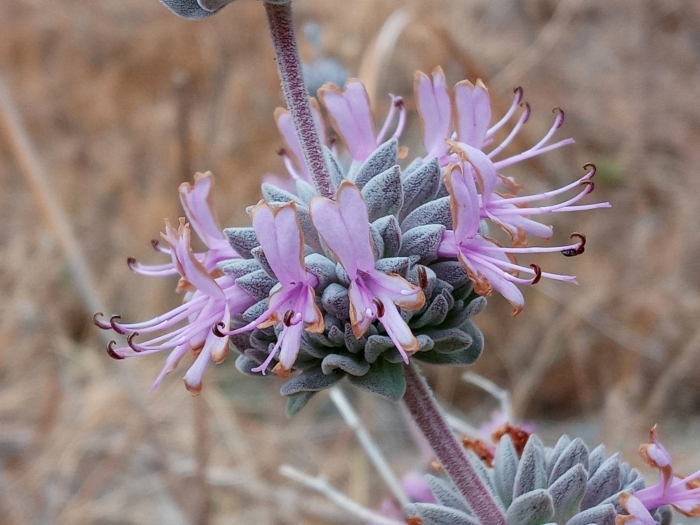Purple Sage
(Salvia leucophylla)
Purple Sage (Salvia leucophylla)
/
/

Daniel S.
CC BY 4.0
Image By:
Daniel S.
Recorded By:
Copyright:
CC BY 4.0
Copyright Notice:
Photo by: Daniel S. | License Type: CC BY 4.0 | License URL: http://creativecommons.org/licenses/by/4.0/ | Rights Holder: Daniel S. | Publisher: iNaturalist | Date Created: 2021-05-16T20:27:54Z |





















































Estimated Native Range
Summary
Salvia leucophylla, commonly known as Purple Sage, is an evergreen subshrub or shrub native to the coastal sage scrub and chaparral of California and the northern part of Baja California, Mexico. It typically grows to a height and width of 3-5 feet (0.9-1.5 meters), with a rounded and spreading habit. The leaves are silvery-gray due to a dense covering of fine hairs, and the plant is highly aromatic. From late spring to early summer, it produces whorls of tubular, lavender to purple flowers that are attractive to bees, butterflies, and hummingbirds. The flowers are quite showy and add a splash of color to the garden landscape.
Purple Sage is valued for its drought tolerance, fragrant foliage, and attractive flowers. It is often used in xeriscaping, native plant gardens, and as an ornamental in dry, sunny beds and borders. Purple Sage requires minimal maintenance once established and is suitable for creating low-water landscapes. It thrives in full sun and well-drained soils, and it is tolerant of poor, rocky soils and coastal conditions. While it is generally pest and disease-free, overwatering can lead to root rot. It is also important to note that Salvia leucophylla can spread readily by seed and may become invasive in some areas outside its native range.CC BY-SA 4.0
Purple Sage is valued for its drought tolerance, fragrant foliage, and attractive flowers. It is often used in xeriscaping, native plant gardens, and as an ornamental in dry, sunny beds and borders. Purple Sage requires minimal maintenance once established and is suitable for creating low-water landscapes. It thrives in full sun and well-drained soils, and it is tolerant of poor, rocky soils and coastal conditions. While it is generally pest and disease-free, overwatering can lead to root rot. It is also important to note that Salvia leucophylla can spread readily by seed and may become invasive in some areas outside its native range.CC BY-SA 4.0
Plant Description
- Plant Type: Shrub
- Height: 3-5 feet
- Width: 3-5 feet
- Growth Rate: Rapid
- Flower Color: Purple
- Flowering Season: Spring, Summer
- Leaf Retention: Evergreen
Growth Requirements
- Sun: Full Sun
- Water: Low
- Drainage: Medium, Fast
Common Uses
Bank Stabilization, Bee Garden, Bird Garden, Border Plant, Butterfly Garden, Deer Resistant, Drought Tolerant, Erosion Control, Fragrant, Groundcover, Hummingbird Garden, Low Maintenance, Rabbit Resistant, Rock Garden, Salt Tolerant, Showy Flowers, Street Planting
Natural Habitat
Coastal sage scrub and chaparral of California and northern Baja California, Mexico
Other Names
Common Names: Purple Sage , Gray Sage
Scientific Names: Salvia leucophylla , Audibertia nivea , Audibertiella nivea , Ramona nivea
GBIF Accepted Name: Salvia leucophylla Greene